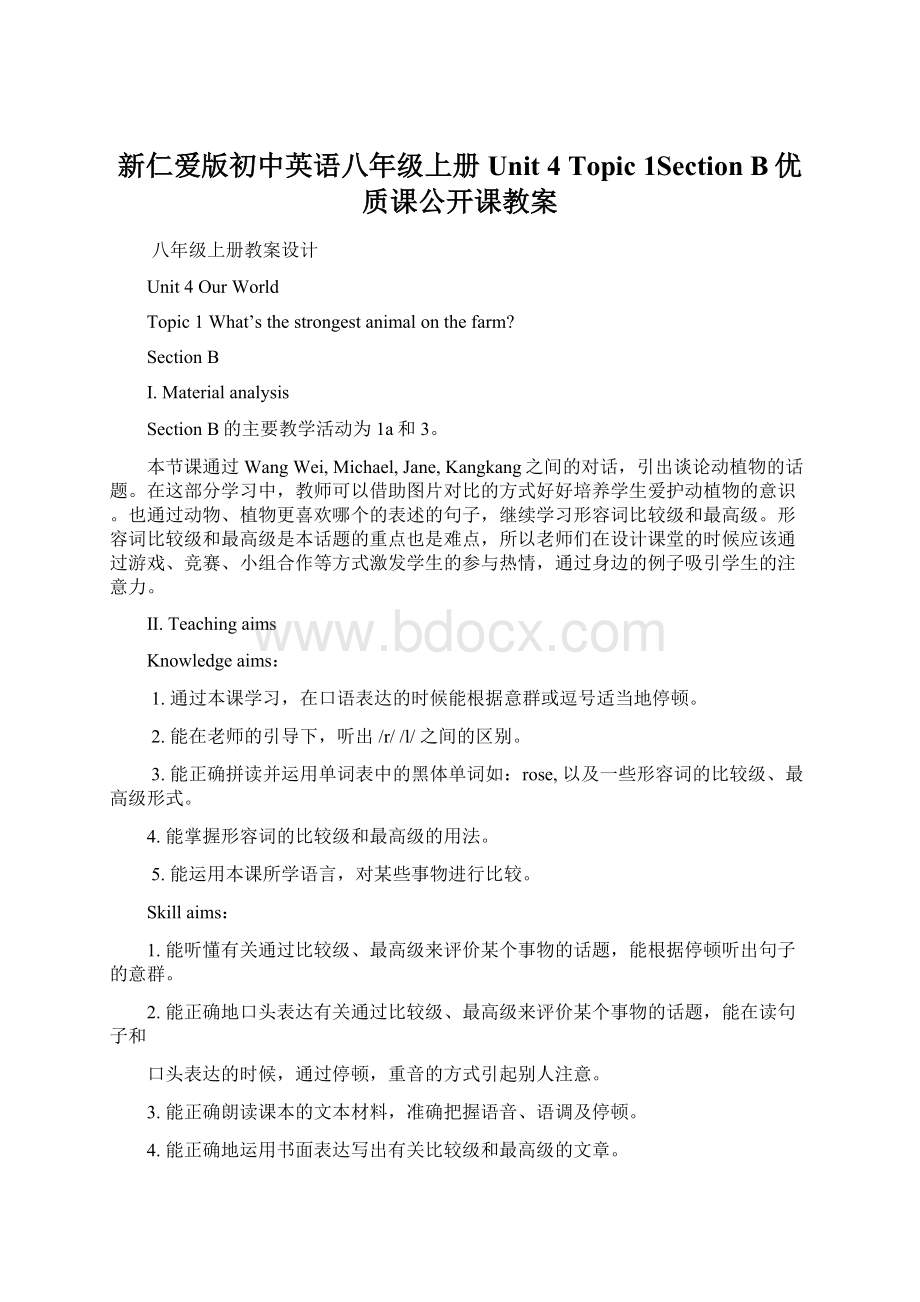新仁爱版初中英语八年级上册Unit 4 Topic 1Section B优质课公开课教案.docx
《新仁爱版初中英语八年级上册Unit 4 Topic 1Section B优质课公开课教案.docx》由会员分享,可在线阅读,更多相关《新仁爱版初中英语八年级上册Unit 4 Topic 1Section B优质课公开课教案.docx(10页珍藏版)》请在冰豆网上搜索。

新仁爱版初中英语八年级上册Unit4Topic1SectionB优质课公开课教案
八年级上册教案设计
Unit4OurWorld
Topic1What’sthestrongestanimalonthefarm?
SectionB
Ⅰ.Materialanalysis
SectionB的主要教学活动为1a和3。
本节课通过WangWei,Michael,Jane,Kangkang之间的对话,引出谈论动植物的话题。
在这部分学习中,教师可以借助图片对比的方式好好培养学生爱护动植物的意识。
也通过动物、植物更喜欢哪个的表述的句子,继续学习形容词比较级和最高级。
形容词比较级和最高级是本话题的重点也是难点,所以老师们在设计课堂的时候应该通过游戏、竞赛、小组合作等方式激发学生的参与热情,通过身边的例子吸引学生的注意力。
Ⅱ.Teachingaims
Knowledgeaims:
1.通过本课学习,在口语表达的时候能根据意群或逗号适当地停顿。
2.能在老师的引导下,听出/r//l/之间的区别。
3.能正确拼读并运用单词表中的黑体单词如:
rose,以及一些形容词的比较级、最高级形式。
4.能掌握形容词的比较级和最高级的用法。
5.能运用本课所学语言,对某些事物进行比较。
Skillaims:
1.能听懂有关通过比较级、最高级来评价某个事物的话题,能根据停顿听出句子的意群。
2.能正确地口头表达有关通过比较级、最高级来评价某个事物的话题,能在读句子和
口头表达的时候,通过停顿,重音的方式引起别人注意。
3.能正确朗读课本的文本材料,准确把握语音、语调及停顿。
4.能正确地运用书面表达写出有关比较级和最高级的文章。
Emotionalaims:
通过对SectionB的学习,要求学生明白动植物能带给我们欢乐、使我们的世界更美丽,保护动植物,让我们和花鸟鱼虫和谐生存。
Ⅲ.Thekeypointsanddifficultpoints
Keypoints:
1.复习比较级和最高级的用法。
2.从重音、停顿等方面培养自己的口语。
3.复习/r//l/之间的发音区别。
Difficultpoints:
1.比较级和最高级在句子当中的正确使用。
2.根据音标写单词的时候容易漏掉不发音的字母。
Ⅳ.Learningstrategies:
比较级这一语法比较难,在学习的时候多想想自己和朋友的变化,试着多用英语夸夸同
学的进步,不仅能增进感情,还能练习语法点。
Ⅴ.Teachingaids
Computermultimediaprojector,pictures,cardswithtable
Ⅵ.Teachingprocedures
Step
Interactionpattern
Studentactivity
Teacheractivity
Introduction
(5minutes)
1.Thewhole
classwork
2.Thewhole
classwork
andindividualwork
3.Thewhole
classwork
4.Thewhole
classwork
5.Groupwork
6.Individual
work
1.Focustheirattention
ontheteacher.
2.Studentslookatthe
beautifulpictureshappily.
Whentheyseetheuglypicture,theymayfeelbad.Allofthestudentslikethebeautifulone.
3.Listentotheteacher.
4.Studentsstudythe
pronunciationand
spellingof“rose”.
5.Studentsanswerthe
questionswith
comparativeand
superlativedegrees.
Theanswermaybe“Ilike...better,becauseitiscute/beautiful...”
6.Answerquestionsandreviewcomparative
andsuperlativedegrees.
1.Getstudentsreadyfor
learning.
2.Show2picturestostudents.
Oneisbeautiful.Thereare
manyanimalsandflowers
init.Peopleplaywiththeir
petshappily.Teachercan
choosethepictureslike
garden,park...Theotherone
isveryugly,likepollution.
Askstudents,“Whichonedo
youlikebetter?
”
3.Educatestudentstoprotect
environmenttogivetheanimalsandflowersanicer“home”.
4.Showthe4picturesof1a
tostudents.Teachthenewword“rose”here.
5.Askstudents,“Whichdo
youlikebetter,plantsoranimals?
Why?
”
6.Invitestudentstoanswer
thisquestion.
Presentation
(10minutes)
1.Individualwork
2.Individualwork
3.Individualwork
4.Thewhole
classwork
5.Groupwork
6.Individualwork
andgroup
work
7.Pairwork
1.Studentslistento1a
andwritedownthe
answers.Theycan
hear“Ilikeanimals
better./Ilikeplants
better.”
2.Listento1aagainand
finish1b.
3.Studentssharetheir
answersafterthe
examples.
4.Readafterthetape
sentencebysentence.
Marksomepauseif
necessary.
5.Studentsreadthe
passageingroups.
Groupleaderscheck
whetherallthe
memberscanreadthepassageandhelpthosewhocan’tread.
6.Studentsread1a
carefullyandfillintheblanks.Studentshadbetterfillintheblanksaccordingtotheirmemories.Thensharetheanswersingroups.
7.Reportthepassageto
theirpartners.
Finish1a.
1.Play1a.Showtwo
questionstostudents,
“WhichdoesMichaellike
better,plantsoranimals?
”
“WhichdoesWangWei
likebetter,plantsor
animals?
”
2.Checktheanswersand
play1aagain.Askstudentstofinish1b.
3.Invitestudentstoshare
theiranswerswithawholesentence.E.g.WangWeilikesrosesbetter.Hethinksrosesarethenicestofalltheflowers.
4.Play1asentencebysentence.Askstudentstopay
attentiontothe
pronunciationandthe
pause.
5.Givestudentsseveral
minutestoreadthe
passage.
6.Show1ctostudents.Ask
studentstoread1acarefullyandfillintheblanks.
7.Organizethestudentsto
sharetheanswers.
Consolidation
(10minutes)
1.Thewhole
classwork
andgroup
work
2.Pairwork
3.Individual
work
1.Eachstudentshould
surveyfourstudentsasquicklyaspossible.Theycanusethesentencesin1a.
A:
Whichdoyoulike
better,plantsor
animals?
B:
Ilike...better.
A:
Why?
B:
Becauseitisthe...
Inthispartstudents
shouldlearntheteamwork.Byinterviewing
eachother,students
shouldlearnthe
cooperationandthe
competition.
2.Studentsputtheir
handshigh.Maketheconversations.
3.Volunteersreporttheir
resultslikethis:
Jack
likesanimalsbetter,
becausehethinks
animalsareverycute.
Peterlikes…best,
because...Annlikes
bothplantsand
animalsbecause...
Finish2.
1.Playagame.Whichgroup